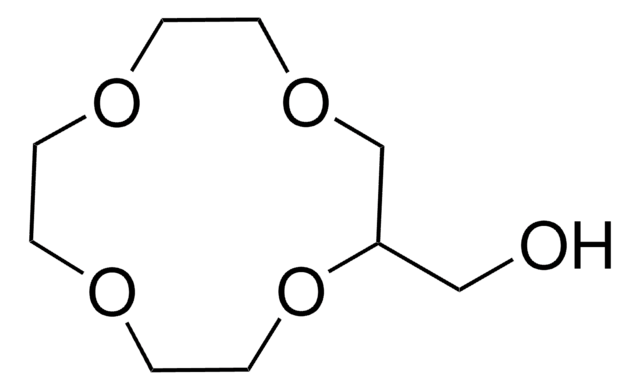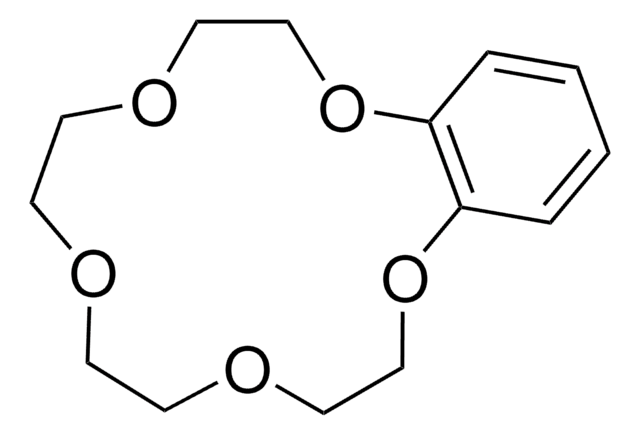194905
12-Crown-4
98%
Synonym(s):
1,4,7,10-Tetraoxacyclododecane
Sign Into View Organizational & Contract Pricing
All Photos(1)
About This Item
Empirical Formula (Hill Notation):
C8H16O4
CAS Number:
Molecular Weight:
176.21
Beilstein:
1363064
EC Number:
MDL number:
UNSPSC Code:
12352005
PubChem Substance ID:
NACRES:
NA.22
Recommended Products
Assay
98%
form
liquid
refractive index
n20/D 1.463 (lit.)
bp
61-70 °C/0.5 mmHg (lit.)
mp
16 °C (lit.)
density
1.089 g/mL at 25 °C (lit.)
functional group
ether
SMILES string
C1COCCOCCOCCO1
InChI
1S/C8H16O4/c1-2-10-5-6-12-8-7-11-4-3-9-1/h1-8H2
InChI key
XQQZRZQVBFHBHL-UHFFFAOYSA-N
Looking for similar products? Visit Product Comparison Guide
General description
12-Crown-4 is a crown ether generally used as a ligand in coordination chemistry. It is also known as lithium ionophore because of its strong chelating property specific to lithium cation.
Application
12-Crown-4 can be used as:
- A promoter in the synthesis of poly(diethylsiloxane) (PDES) from monomer hexaethylcyclotrisiloxane using NaOH as a catalyst via anionic ring-opening polymerization.
- As an additive in the preparation of triarylmethane derivatives by palladium-catalyzed cross coupling reaction of aryl bromides with diarylmethane derivatives.
- A phase transfer catalyst in organic synthesis.
Signal Word
Danger
Hazard Statements
Precautionary Statements
Hazard Classifications
Acute Tox. 1 Inhalation
Storage Class Code
6.1A - Combustible acute toxic Cat. 1 and 2 / very toxic hazardous materials
WGK
WGK 3
Flash Point(F)
235.4 °F - closed cup
Flash Point(C)
113 °C - closed cup
Personal Protective Equipment
dust mask type N95 (US), Eyeshields, Gloves
Choose from one of the most recent versions:
Already Own This Product?
Find documentation for the products that you have recently purchased in the Document Library.
Preparation of poly (diethylsiloxane) with the NaOH/12-crown-4 catalyst
Hedden RC and Cohen C
Polymer, 41(18), 6975-6979 (2000)
Mazhar Ali Abbasi et al.
Sensors (Basel, Switzerland), 12(11), 15424-15437 (2012-12-04)
In this study honeycomb-like NiO nanostructures were grown on nickel foam by a simple hydrothermal growth method. The NiO nanostructures were characterized by field emission electron microscopy (FESEM), high resolution transmission electron microscopy (HRTEM) and X-ray diffraction (XRD) techniques. The
Zehra Edis et al.
Pathogens (Basel, Switzerland), 8(4) (2019-10-30)
Antimicrobial agents containing symmetrical triiodides complexes with halogen bonding may release free iodine molecules in a controlled manner. This happens due to interactions with the plasma membrane of microorganisms which lead to changes in the structure of the triiodide anion.
Multilayered ion-imprinted membranes with high selectivity towards Li+ based on the synergistic effect of 12-crown-4 and polyether sulfone
Lu J, et al.
Applied Surface Science, 427, 931-941 (2018)
Márkó Grabarics et al.
The Analyst, 145(19), 6313-6333 (2020-07-28)
In the past decade, ion mobility spectrometry (IMS) in combination with mass spectrometry (IM-MS) became a widely employed technique for the separation and structural characterization of ionic species in the gas phase. Similarly to chromatography, where studies on the mechanism
Our team of scientists has experience in all areas of research including Life Science, Material Science, Chemical Synthesis, Chromatography, Analytical and many others.
Contact Technical Service








